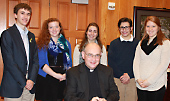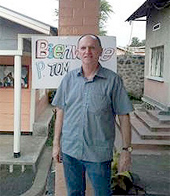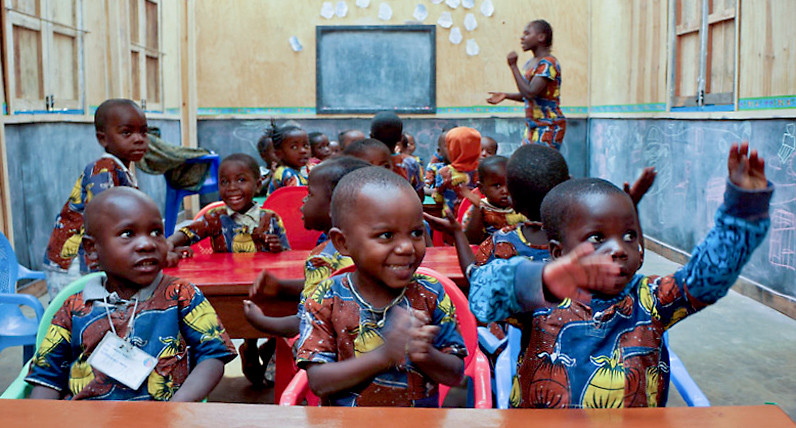Magazine

News - Partners Spring 2015
Return to Partners Index
John Carroll University became the fifth Jesuit university to earn “Fair Trade University” status from Fair Trade Campaigns. John Carroll joins Creighton University, Loyola Marymount University, Saint Joseph’s University, and Seattle University, and is also the first university in Ohio to earn the status. Fair Trade Campaigns is a grassroots movement mobilizing thousands of conscious consumers and Fair Trade advocates on campuses and communities across the US.
Rev. Robert L. Niehoff, SJ, president of John Carroll University, signed a resolution on December 17, 2014, to declare John Carroll a Fair Trade University, surrounded by members of the campus student organization JCU Students for Social Justice, who organized the campaign. Prior to Niehoff’s official signing, John Carroll’s student government and faculty senate overwhelmingly endorsed resolutions in support of the campus effort.
“As a Jesuit university committed to human dignity, environmental sustainability, and economic justice for all, the decision to become a Fair Trade University is a natural expression of our mission,” said Fr. Niehoff. “I am proud of our students and congratulate [them] for their persistent dedication to this important work. These students have already been educating the campus about what this commitment means for us and how it will impact others. What was begun as advocacy developed into educational engagement, and this is an important step for our learning community.”
Photo: John Carroll University President Fr. Robert Niehoff, SJ (center), signs the fair trade agreement with JCU students (left to right) Andrew Schettler ‘17, Grace Donnelly ‘16, Catherine Looby ‘17, Dominic Gideon ‘18, and Kaylee Quanbeck ‘17.
On February 3, Pope Francis formally recognized that Archbishop Romero, who was shot and killed on March 24, 1980, as he celebrated Mass in San Salvador, was murdered “in hatred of the faith” — and not for purely political reasons. Last month, the Vatican also announced that the beatification process for Fr. Grande had been opened.
Building on the success of last year’s “Moved to Greater Love” multimedia Lent program, the Jesuits have expanded their audience this Lent with “Igniting Our Values.” More than 21,000 users worldwide have journeyed through Lent with the new program, which is available online at jesuits.org/igniting, as a daily email, or as a weekly PDF file for those who prefer an offline experience.
“Our goal is to encourage Jesuits, Ignatian colleagues, and a wide range of others to think about Ignatian values as an entry point for daily meditation,” explained Jesuit Brother Michael Breault, who, in addition to leading the National Vocation Promotion Office, spent the better part of the past year putting the program together.

|
JCU Becomes Fifth Jesuit Fair Trade University |
John Carroll University became the fifth Jesuit university to earn “Fair Trade University” status from Fair Trade Campaigns. John Carroll joins Creighton University, Loyola Marymount University, Saint Joseph’s University, and Seattle University, and is also the first university in Ohio to earn the status. Fair Trade Campaigns is a grassroots movement mobilizing thousands of conscious consumers and Fair Trade advocates on campuses and communities across the US.
Rev. Robert L. Niehoff, SJ, president of John Carroll University, signed a resolution on December 17, 2014, to declare John Carroll a Fair Trade University, surrounded by members of the campus student organization JCU Students for Social Justice, who organized the campaign. Prior to Niehoff’s official signing, John Carroll’s student government and faculty senate overwhelmingly endorsed resolutions in support of the campus effort.
Photo: John Carroll University President Fr. Robert Niehoff, SJ (center), signs the fair trade agreement with JCU students (left to right) Andrew Schettler ‘17, Grace Donnelly ‘16, Catherine Looby ‘17, Dominic Gideon ‘18, and Kaylee Quanbeck ‘17.

|
Archbishop Romero to be Beatified May 23; Jesuit Father Rutilio Grande’s Beatification Process Opened |
March 16, 2015 — The Vatican has announced that Salvadoran Archbishop Oscar Romero will be beatified in San Salvador on May 23. Italian Archbishop Vincenzo Paglia announced the beatification date on the eve of the anniversary of the assassination of a close friend of Archbishop Romero: Jesuit Father Rutilio Grande, the first priest executed by Salvadoran death squads on March 12, 1977.
On February 3, Pope Francis formally recognized that Archbishop Romero, who was shot and killed on March 24, 1980, as he celebrated Mass in San Salvador, was murdered “in hatred of the faith” — and not for purely political reasons. Last month, the Vatican also announced that the beatification process for Fr. Grande had been opened.
Scholars and theologians agree that Archbishop Romero was strongly influenced by the pastoral work that Fr. Grande carried out in poor rural communities in northern San Salvador.
Archbishop Romero once said: “When I looked at Rutilio lying there dead I thought, ‘If they have killed him for doing what he did, then I, too, have to walk the same path.’”
Archbishop Romero once said: “When I looked at Rutilio lying there dead I thought, ‘If they have killed him for doing what he did, then I, too, have to walk the same path.’”
The Italian newspaper Avvenire reported that the archbishop met Fr. Grande in 1967 at the seminary of San Jose de la Montana, where the Jesuit taught.
According to one colleague, Fr. Grande believed the only solution to “the evils of Salvador” lay in taking the Gospel to the people. He was convinced that by following Christ and being inspired by love, the Gospel could transform people and institutions more deeply than any political program or policy, the newspaper reported.
Photo: Archbishop Oscar Romero (left) and Jesuit Father Rutilio Grande
Photo: Archbishop Oscar Romero (left) and Jesuit Father Rutilio Grande

|
Ignatian Lent Program a Hit More than 21,000 users worldwide have journeyed through Lent with the new program |
“Our goal is to encourage Jesuits, Ignatian colleagues, and a wide range of others to think about Ignatian values as an entry point for daily meditation,” explained Jesuit Brother Michael Breault, who, in addition to leading the National Vocation Promotion Office, spent the better part of the past year putting the program together.
The 47 “Igniting Our Values” contributors are Jesuits and lay people, friends and family, alumni, teachers, administrators, retreat directors, social workers, parish staff, spiritual directors, Ignatian partners and colleagues in mission. Their occupations range from sound editor to general contractor, from nurse to policy maker, from lawyer to chef—a diverse group of ordinary people who share the extraordinary impact of Ignatian spirituality.
Jesuit Father Jack Bentz composed daily prayers to complement the reflections and connect themes from the Scriptural readings to the particular Jesuit/Ignatian value under consideration.
The immersive program is enhanced with a carefully curated selection of music, video, art, prose and poetry, as well as a special weekly focus on the Blessed Mother. Reflections and the Gospel readings are available in Spanish and English.
The immersive program is enhanced with a carefully curated selection of music, video, art, prose and poetry, as well as a special weekly focus on the Blessed Mother. Reflections and the Gospel readings are available in Spanish and English.
Br. Breault points out that the deciding factor for most young people who are choosing a religious order is how well the members “own” their collective religious identity. “Stats show that young people are most likely to join those religious communities whose members consistently exhibit a clear and joyous appropriation of the order’s unique identity,” he said. “So by clarifying our identity as Jesuits and ‘Ignatians,’ we are also promoting vocations to the Society of Jesus.”
It’s not too late to experience “Igniting Our Values”! Visit jesuits.org/igniting to join people around the world in prayerfully considering the meaning of discipleship in today’s dizzyingly distracted world.
In 1980, a refugee crisis seized world headlines. Vietnamese were fleeing their county in anything that could float, and images of the “boat people” were seared into many peoples’ hearts. Father Pedro Arrupe, SJ, then-Superior General of the Society of Jesus, was one such person. He motivated Jesuits around the world to respond to the crisis, and the Jesuit Refugee Service (JRS) was born. The organization’s motto—to accompany, serve and advocate—distinguishes JRS from other refugee-service agencies and is the foundation for its response to other refugee crises throughout the world. As JRS celebrates 35 years, it also prepares to welcome a new international director to its headquarters in Rome.
German Jesuit Father Peter Balleis is finishing his eight-year term as JRS International Director this year. Fr. Balleis worked extensively in southern Africa before moving to Rome, and under his leadership, JRS is now present in Iraq and Syria, among other recent refugee crises.
Father Balleis’ successor, Fr. Tom Smolich, SJ, is currently immersing himself in JRS’ mission by accompanying refugees in the Democratic Republic of Congo (DRC). Father Smolich, a California Province Jesuit who finished his term as president of the Jesuit Conference last year, is spending four months in the town of Masisi in the North Kivu Province, learning from refugees and staff about what it is to “be part of JRS and how I can best serve in my new assignment.” While he’s there, Fr. Smolich is working as the JRS Bureau bookkeeper and accompanying refugees in the camps — as well as learning to speak French and read Swahili.
Working in seven refugee camps in and around Masisi, JRS offers services to displaced people in each community: education; pastoral counseling and psycho-social accompaniment; supplies and services for the most vulnerable; and income-generating training, such as carpentry, soap making and hairdressing. JRS’ focus on formal and informal education helps provide structure and normalcy to lives destroyed by war.
Father Smolich is grateful for the opportunity to work with refugees in Masisi. “It was Fr. Balleis’ idea to send me here. I’m getting the best preparation possible, and I am honored and excited to succeed him.”
|
||
Return to Partners Index
 Fr. Tom Smolich, SJ, is in the Democratic Republic of Congo to prepare for his upcoming role as international director of Jesuit Refugee Service.
Fr. Tom Smolich, SJ, is in the Democratic Republic of Congo to prepare for his upcoming role as international director of Jesuit Refugee Service.
